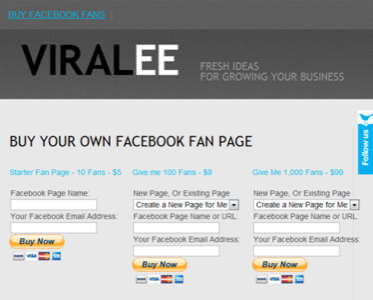When you think of services offering to get you more fans, followers, and friends on social media sites, a few words come to mind: spammy, scammy, and sad. Purchasing fans is taking the easy way out. Instead of building up a community of followers who actually appreciate what you (or your company) has to say, you can give off the appearance of popularity with a store-bought set of fans. While no one in their right mind will come out and say that the social media “marketing” services that deliver followers and fans are worthwhile, the truth is that many people and businesses are using them anyway, even if they won’t admit it. But can any of these services really be trusted?

One of the most notorious companies involved in the “fans for sale” business is USocial. Earlier this year, they were cited in an L.A. Times article regarding their service for gaming Digg, the social news website that relies on user votes to promote stories to the homepage. Stories that make it to Digg’s front page end up receiving massive amounts of traffic – tens of thousands of visitors within hours. Those numbers are tempting. In fact, they’re too tempting for some to resist, apparently. According to USocial’s founder, organizations like a Darfur foundation, the U.S. Marines, the Mormon Church, and the Korean Department of Tourism had all signed up to used the service.
In addition to gaming the social news sites, USocial also offers services for gaining more followers on Twitter, more fans on Facebook, and more recently, more views on YouTube. This latest offering flat-out guarantees your viral video’s success by delivering more traffic and more views to your video pages.

Does all this sound too good to be true? Well, it probably is. Only last month, Facebook sent USocial a cease-and-desist letter to the company after an investigation revealed USocial was breaking multiple laws, including illegally accessing the Facebook website and violating the Terms of Service. Among the violations, Facebook stated USocial was sending spam, using web tools to harvest pages, getting login names, and accessing accounts that did not belong to the marketing firm. Yes, that last one sounds a lot like hacking, doesn’t it? Does your business really want fans who were obtained in that way?
According to Dominic Holland, founder of Viralee, a new competitor to USocial, his business offers a better way. In an article on Facebook-watching blog AllFacebook, Holland was quoted as saying: “We do not take control of any users account at any time. We create a page for the user and market it within and externally to Facebook.”

On the surface, that sounds more on the up-and-up, but Holland, whose service sells Facebook fans at 10 cents each, won’t say exactly how those fans are acquired…and the Viralee website doesn’t explain either. What it does show is the company’s past efforts – they include fan pages for “Kisses,” “Hugs,” and “Pizza” as well as ongoing efforts for various sports teams, Australia, and the charity Movember.
In the comments of the AllFacebook post, Holland responds to those questioning whether these “fans” are actually from the U.S. by responding that the service can provide targeted fans. Not that it does by default, just that it can. He also defends the “pay for fans” model by explaining that once you’ve acquired a good number of these purchased fans, you’re then exposed to the friend groups of those fans as well. It sounds like he’s saying store-bought fans are just a kick-start method for generating a fan base. The initial group is there to help start the organic growth that comes from natural discovery.
Still, it’s hard to feel anything but skepticism for a business whose Twitter account looks like spam bot, filled with keyword-based updates like “performance based advertising,” “pay per sale,” and “pay per lead,” instead of any actual conversation. And considering that Holland was responding on AllFacebook as Viralee’s founder using Facebook Connect, you would think he would have updated his Facebook photo to something a little more…uh…professional. While there’s nothing wrong with posting “party pics” on Facebook, if you’re publicly representing a company, this is not the sort of image that engenders trust…especially if you’re asking for people’s money.

At the end of the day, companies like Viralee and USocial keep their “marketing” techniques under wraps and undisclosed. They promise fans, but not how they’ll get them or whether they’re legit. And that’s because they’re probably not.
But the argument for using these services – as scammy and spammy as they seem to be – is that they let you get a head start on building your social media profile. First come the store-bought fans, then come the real ones. Or so they say. Although few are willing to go on record admitting they’re involved with services like this, there’s no doubt that many people and businesses are. But the question remains: does any of this really work? And even if it does, is this how you want to achieve success?





















